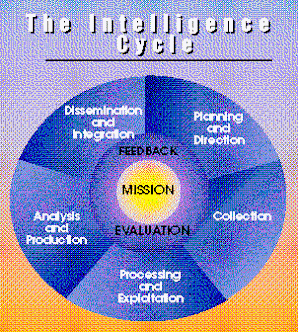The Foundation: Intelligence-led Policing (ILP)
One result of the changes in our society is that today’s criminals are displaying increased sophistication and operational agility in their efforts to subvert law and order. This in turn has created a need for law enforcement agencies – at all levels – to concentrate their collective efforts in a more structured manner and to modernize the various business processes they use to determine resource allocations. Experience suggests that the optimum way to achieve these goals is through a new series of processes and procedures called Intelligence-Led Policing. Intelligence-led policing is an extremely useful way of thinking about law enforcement and delivery of police services. ILP is all about providing decision-makers at any level of a law enforcement organization with the intelligence and analysis upon which to base good decisions.
Intelligence-led policing is both a business model and managerial philosophy. Crime analysis and criminal intelligence are the foundations to an objective, decision-making framework that facilitates crime and problem reduction, disruption and prevention through both strategic management and effective enforcement strategies that target prolific and serious offenders.
Intelligence-led policing was originally thought of as a law enforcement strategy seeking to reduce crime through the combined use of crime analysis and criminal intelligence. The purpose was to determine appropriate crime reduction tactics that concentrate on the prevention and enforcement of criminal offender activity, with a focus on active recidivists.
This approach emphasized information gathering through the extensive use of confidential informants, offender interviews, analysis of recorded crime and calls for service, surveillance of suspects, and community sources of information. These sources were analyzed so that law enforcement managers could determine objective policing tactics in regard to enforcement targets, prevention activities and further intelligence gathering operations.
In the last few years, the interpretation of 'intelligence-led policing' appears to be broadening in scope. While still retaining the central notion that police should avoid getting bogged down in reactive, individual, case investigations, intelligence-led policing is evolving into a management philosophy that places greater emphasis on information-sharing and collaborative, strategic solutions to crime problems at the local and regional level.
Originating in the United Kingdom, intelligence-led policing began with the idea that police were spending too much time responding to crime and too little time targeting offenders. Audit reports encouraged increased use of intelligence, surveillance and informants to target recidivist offenders so that police could be more effective in fighting crime. Since then, ILP and its practice has extended to Australia, New Zealand, Europe, and since September 11th, 2001, the United States.
However, ILP will never reach its true potential unless all police, law enforcement and public safety leaders catch the vision of this important paradigm. Intelligence-led policing is a model that has gained significant acceptance in the United States since 9/11. There is a good reason for this: no other single approach can offer the same protection in the current worldwide environment of crime, terrorism and the explosion of information. More importantly, in its wider application ILP works well with other models and enhances them by providing a foundation of analysis. Whatever policing approach that is adopted locally, ILP can make it work better. It does so by providing the intelligence and information on which to more accurately base decisions about any given problem or situation.
Links for further information on Intelligence-led Policing:
- IALEIA. Intelligence-led Policing: Getting Started.
- Colonel Joseph R. Fuentes. Practical Guide to Intelligence-led Policing. New Jersey State Police.
- Marilyn Peterson. Intelligence-led Policing: The New Intelligence Architecture. Bureau of Justice Assistance.
- Angus Smith (ed). Intelligence-led Policing: International Perspectives on Policing in the 21st Century. IALEIA.
- Nick Tilley & Jill Dando. Problem-Oriented Policing, Intelligence-Led Policing and the National Intelligence Model. University College London.
- Association of Chief Police Officers. Practice Advice: Introduction to Intelligence-Led Policing. National Centre for Policing Excellence.
- Jerry H. Ratcliffe. Intelligence-led Policing. Australian Institute of Criminology.


0 comments:
Post a Comment